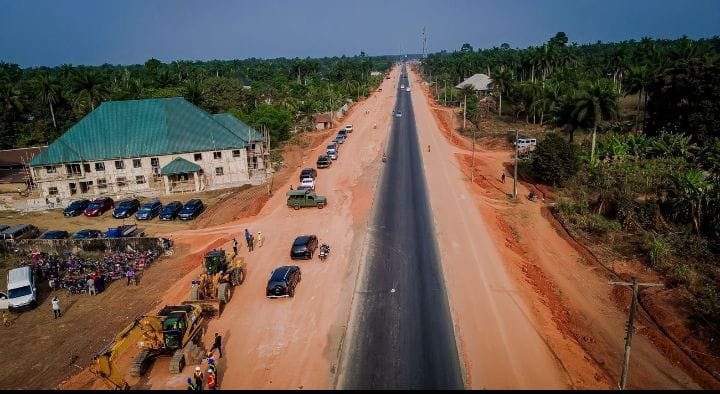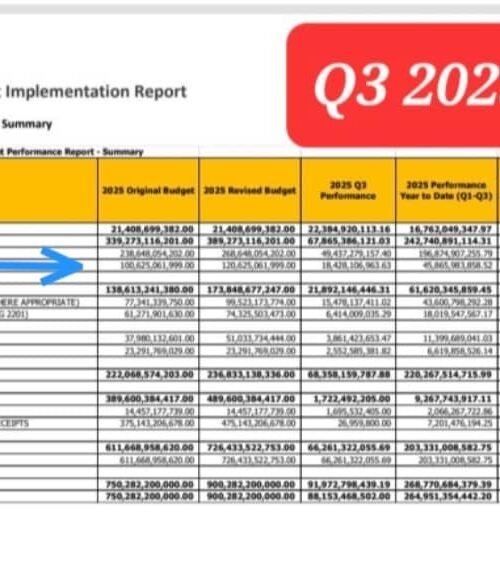“The Road to Nowhere: Otti’s Odyssey of Broken Promises”

In a shocking turn of events, the Owerrinta-Umuikaa Road project, hailed as a beacon of hope for Abia State, has been dismissed to have a striking similarity to the infamous “Road to Nowhere” in North Carolina, USA. The Road to Nowhere, a 6.5-mile pass that dead-ends at a tunnel, was abandoned by the government in 1969 due to concerns over acid runoff from exposed rocks. Despite a $52 million settlement with the local government, the road remains unfinished, a haunting reminder of the government’s unfulfilled promises.
As Abia State embarks on its own ambitious road project, one can’t help but wonder if history is doomed to repeat itself. Will the Owerrinta-Umuikaa Road project suffer the same fate as the Road to Nowhere, or will Governor Otti’s administration prove to be the exception to the rule?
Only time will tell if Abia State’s bold vision for progress and development will come to fruition, or if it will succumb to the pitfalls of abandoned projects and unfulfilled promises.
Hmmm? But come ooo, my concern here is the age-old problem of criticism for criticism’s sake. It’s indeed frustrating to see opposition resort to tired, unconstructive methods. The question is, how can we encourage more intelligent, refreshing feedback that actually benefits the Otti-led administration?
Here is the revised version:
Our intel gathered from a casual hangout in one of the numerous bars in Umuahia revealed the opposition’s plan to criticize the Otti-led administration’s projects. The question is, for how long will they continue to use the same old tactics? Wouldn’t it be refreshing to see them provide intelligent feedback that could actually benefit the administration?
Encouraging open dialogue is essential. Creating opportunities for people to share their thoughts and concerns in a safe, respectful environment can help promote constructive criticism. Modeling constructive criticism is also crucial, as it shows others what it means to give and receive feedback in a respectful manner.
Focusing on specific issues rather than generalizing or making personal attacks is also important. Encouraging critics to focus on specific aspects of the projects that can be improved can help create a more constructive conversation. Seeking common ground and looking for areas of agreement can also help build on shared interests and promote more intelligent feedback.
Okay, having said this much, let’s discuss the latest Otti outing.
The recent flag-off of the reconstruction and dualisation of the 5.5-kilometre Owerrinta-Umuikaa Road is not merely an infrastructural project; it is a bold statement of intent—a declaration that Abia is ready to reclaim its destiny as a hub of economic prosperity and social progress.
Governor Otti’s speech at the ceremony was a masterclass in visionary leadership. He articulated a philosophy that transcends the mundane and speaks to the very soul of governance. Roads, he noted, are more than just pathways; they are the lifeblood of a society, the arteries through which the life force of commerce, culture, and community flows. They are the silent narrators of a people’s journey, telling tales of where they have been and pointing the way to where they are headed.
The Owerrinta-Umuikaa Road project is emblematic of this philosophy. Once completed, it will serve as a gateway, not just into Abia but into a future brimming with possibilities. It will connect communities, facilitate trade, and open up new vistas for investment. But more than that, it will stand as a testament to the power of visionary leadership—a leadership that dares to dream big and has the courage to turn those dreams into reality.
What sets Governor Otti’s administration apart is its unwavering commitment to execution. In a country where abandoned projects are all too common, Abia stands out as a beacon of hope. The government’s meticulous planning, prudent financial management, and insistence on engaging only the most competent contractors have ensured that every project embarked upon is seen through to completion. This is not governance by accident; it is governance by design—a deliberate, calculated approach that leaves no room for failure.
The economic implications of the Owerrinta-Umuikaa Road project are profound. By easing the movement of goods and people, it will catalyze economic activity in the region. Farmers in Abam, long hindered by the dilapidated state of the old bridge, will now have unimpeded access to markets, boosting agricultural productivity and livelihoods. The proposed medical city along this corridor will not only provide world-class healthcare but also create jobs and attract further investment. This is development in its truest sense—development that touches lives and transforms communities.
But Governor Otti’s vision extends far beyond roads. His administration is laying the groundwork for a new Abia—a state where the urban sprawl between Aba and Umuahia will merge into a single, vibrant metropolitan area. This ambitious plan, rooted in the belief that “impossibility doesn’t exist,” is a clarion call to all Abians to dream big and work hard. It is a reminder that the only limits to what we can achieve are those we impose on ourselves.
The partnership with Radisson Blu to reconstruct the Enyimba International Hotel and build a world-class convention centre is another feather in the cap of this administration. It is a bold statement that Abia is open for business, ready to take its place on the global stage. This is not just about hospitality; it is about creating a narrative—a narrative of a state that is dynamic, forward-looking, and unafraid to embrace the future.
Yet, none of this would be possible without the active participation of the people. Governor Otti’s call for prompt and regular payment of taxes is not just a fiscal imperative; it is a moral one. It is a call to collective responsibility, a reminder that the task of building a new Abia is one that requires the efforts of all. The administration’s prudent use of public resources, evident in the scale and scope of projects undertaken, is a testament to its commitment to transparency and accountability.
As the reconstruction of the Owerrinta-Umuikaa Road begins, Abia stands at the cusp of a new era. This is not just about infrastructure; it is about hope, progress, and the relentless pursuit of excellence. It is about a leadership that dares to dream and a people who are ready to turn those dreams into reality.
In the words of Governor Otti, “When a man says yes, his personal god nods in agreement.” Abia has said yes to progress, yes to development, and yes to a future filled with promise. And as the wheels of progress turn, one thing is clear: the best is yet to come.

God bless Abia State!
Dr Chukwuemeka Ifegwu Eke writes from the University of Abuja/Yakubu Gowon University Nigeria.







